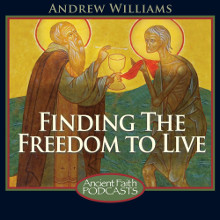 I’ve been reflecting on two little anecdotes I mentioned in recent podcasts.
I’ve been reflecting on two little anecdotes I mentioned in recent podcasts.
The first was about a group of monks on a journey when a scantily-dressed woman rode by. Most of the monks immediately averted their eyes, but when they turned back, they found that one of their number, far from averting his eyes, was still watching the woman disappearing into the distance. When they questioned him about his actions, he replied, “But how could you expect me to avert my eyes when such a beautiful wonder of God’s Creation passed by?”
The other anecdote is about a visit with St Porphyrios. The spiritual child was excited about some ideas he had about good things he could do with his life, and had been telling the Elder about them. But later, he discovered the Elder had not thought about this the way he did, and upon asking the Elder what he saw, received the reply “The opposite.” The man understood that what he had revealed to the Elder was, as he put it, “the shiny surface” of his soul, and not the deep, dark places within.
In his words and actions, that one monk showed what kind of a person he was — and his brethren were amazed. And in the other anecdote, the Elder was able to perceive who the person really was behind his words — and the man was able to confess it.
Don't only confess what you've done; confess who you are. Share on X
I’ve heard some priests say that more important than confessing what you’ve done is to confess who you are. That is, rather than only confessing what rules we’ve broken, what offences we’ve committed, we also need to look deep into our hearts — into the deep, dark places — and confess the deepest parts of ourselves, those things which most deeply inform and underlie our way of life.
I have an image of myself — and sometimes, I get confused between the person I want to be and the person I actually am. This is when I look at the shiny surface of my soul, and think that’s all there is. So I examine myself before confession and find that my outward life has not conformed to the shiny surface of my soul. That is, I know that I want to be loving to all, but sometimes I get angry. I know that I want to be holy, and yet I often forget to pray.
The fathers tell us it is important to know ourselves, but how many of us can really say that we do? Share on XBut self-examination or introspection done this way is of limited effectiveness — in fact, it can even become negative as I get used to examining the shiny surface of my soul, and fail to suspect what lies beneath. And what lies beneath may be dormant — until suddenly I enter a crisis in my life, and gradually the deeper darkness within starts to be revealed. The fathers tell us that it is important to know ourselves, but how many of us can really say that we do — really, deep-down into the heart?
Without seeing deep down, we can confess what we have done. And this is indeed good — but limited. As we confess what we have done, we are tempted to see sin more as the breaking of rules than the deforming of persons. And if we think this way about ourselves, it becomes natural to think this way of others. I might say, “Why can’t he just not do that?” If only I could see this not just as a rhetorical question, but a very live one… Why indeed? Why can’t _I_ just not do that? To find out, I will have to look down beyond the shiny surface of my soul, to the dragons playing beneath.
Can we see beyond the shiny surface of our souls to the dragons beneath? God is beyond the dragons. Share on X
St Paul says that the Law was a teacher, guiding people before they had Christ and the Holy Spirit (Gal. 3:10-29; Rom. 7:7-25). Living in the Spirit does not mean that the Law is useless, or forgotten — rather, it gives a whole new perspective on life and fulfils the Law. So it is with our understanding of confession. We learn to confess as we see sin as broken rules, and this is a good lesson. But then we need to go deeper into our own persons, because it is after fighting through the deep, dark dragons inside the soul that we can penetrate to the very centre of our being, the nous, the eye of the soul through which we see God, and through which God’s light and life stream into us from the inside.
Then we step beyond the Law and see its limits. Often we want a simple and specific rule — when a scantily-clad woman rides by, avert your eyes. But what happened with those monks?
I would guess that some of the monks knew that their spirit was not pure enough to look, and that the temptation of looking may be too great. Some of them, perhaps, thought judgmentally of the woman, and rather than noticing the impure state of their own hearts, rather blamed the woman for provoking their awareness of the temptation. Some of them perhaps had simply trained themselves through experience always to look away in such situations lest they be tempted, with no real awareness of whether they may be or not. But that one monk: he was able unselfconsciously and naturally simply to look and to give thanks to God for the beauty of his Creation — presumably without thinking about his own purity or impurity at all, but rather, being constantly in prayer, he was able to share in God’s love for his creation in that moment.
Nothing I take in from outside makes me impure, what does is what comes out of me from inside. Share on XJesus said that it is not what goes into a person that makes a person impure, but what comes out (Mk. 7:15). It’s not what the eye sees, what the ear hears, not what I touch or taste or smell that defiles me. It’s what happens inside me when I receive what I am given inwardly and process it in myself. What do I do with what I receive? What of me do I put into it before I respond? What of God do I allow inside me to change the way I process what I perceive?
I would like to be like that one monk. I suspect that we would all like to be like that one monk. And yet what is standing between me and that goal? Not God — he is ever-present and filling all things. We only have to turn to him fully, and he will share everything with us. So if God does not stand between me and that union with him which brings purity and love out of me from the inside, it must be me.
So I do want to be like that one monk… but this is something I want with the “shiny surface” of my soul. My soul is full of conflicting desires, and is not pure enough to allow this one desire — even of union with God — to comprehend and transform all my other, deeper, darker desires, of which I am often hardly aware. Yet I must try to bring those things into awareness so that I can confess them… so that I can confess the whole of me as I truly am. But to bring those things into awareness means to accept them… to accept that they are currently part of me, even though I would rather not admit this. But if I deny this to myself, how can I ever have self-knowledge? And without self-knowledge, how can I truly confess? How can I even begin to approach humility? And without this honesty about myself — the beginnings of humility — how can I love? In love I need to open myself to the other… how can I do this if I have not even opened myself to me?
Accepting the dark parts in my soul enables me to offer them to God for transformation. Share on X
Accepting myself — accepting these deep, dark parts of me — this actually will turn out to be, against all my expectations, a joyful thing, not a depressing one. It is refusing to accept them that is depressing, as it leaves me cut off from the reality of myself, and thereby cuts me off from deeper union with every other reality, every other person, and from God. It is joyful because it is freeing, because it opens me to be able to truly give and receive love, to find intimacy with others and with God. Accepting these parts of me does not mean blessing them, does not mean pretending they are good; it just means accepting that they are part of me — embracing them as part of me… confessing them to God, and asking him to enter in and transform me — renew my heart and my mind in his love.
And if I am able to achieve this in myself, this frees me. And by my freedom, I am free to truly love others and to love God.


You must be logged in to post a comment.